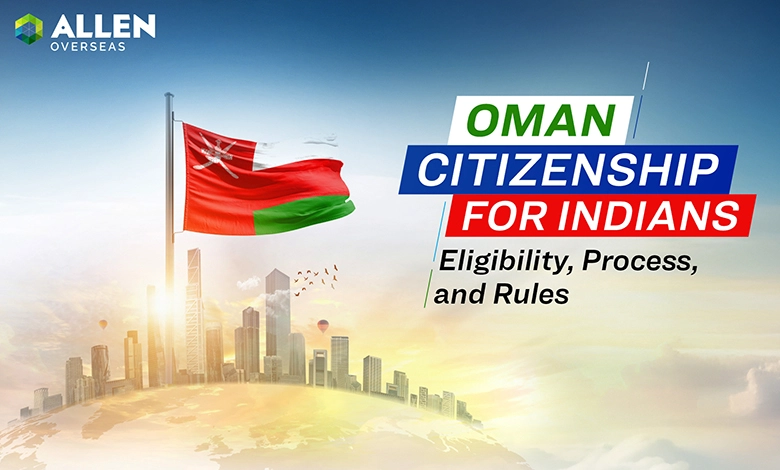- Call Us :
- Mail Us :
- Request a Call



Oman is a popular destination for Indians because of its job opportunities, peaceful lifestyle, and close cultural ties with India. Many Indians live and work in Oman for years, and some even wish to make Oman their permanent home. While Oman offers long-term residency options, getting Omani citizenship is more complex and depends on strict government rules.
In this blog, we explain the eligibility, process, and rules for Indians who want to apply for Oman citizenship.
The Omani government has very strict rules for granting citizenship, and it is not automatically available to anyone who has lived in the country. For Indians, becoming a citizen of Oman is possible, but only if they meet certain conditions set by the Ministry of Interior. Below are the main requirements explained in detail:
One of the most important conditions is completing a long stay in Oman. An Indian applicant must live in Oman continuously for at least 20 years before applying. In some special cases, such as marriage to an Omani woman, the residency requirement is slightly reduced to 15 years. This condition ensures that the person has strong ties with Oman and is well settled in the country.
Citizenship is only considered for people with a good reputation. Applicants must not have any criminal record in Oman or in India. Even minor legal issues can negatively affect the application. The government expects applicants to have a clean background, follow the law, and maintain respectful behavior during their stay in Oman.
Oman wants to make sure that only financially stable individuals are granted citizenship. An Indian applicant must have a steady job, business, or other legal source of income that can support them and their family. This condition shows that the person can contribute to the economy and will not be dependent on state support.
Knowing the Arabic language is an important requirement for citizenship. Applicants are expected to read, write, and communicate in Arabic, as it helps them integrate with local society. In addition, understanding and respecting Omani traditions, values, and culture is important. This shows that the applicant is not just living in the country but has also blended into the community.
Oman does not allow dual citizenship. This means Indians who are approved for Omani nationality must give up their Indian passport. Before applying, it is important to understand that becoming an Omani citizen means fully committing to Omani nationality and leaving behind the rights of Indian citizenship, including the Overseas Citizen of India (OCI) status.
Also Read: Indians in Oman: Education | Lifestyle | Career | Future Options
Applying for citizenship in Oman is not a direct or open process. It is managed by the Ministry of Interior and requires government approval. The steps usually include:
Applying for Omani citizenship is a big decision. While it comes with some strong benefits, it also has a few drawbacks that Indians should consider carefully before taking this step.
For Indians, getting Omani citizenship is difficult and highly selective. The process is long, requires strong integration into Omani society, and final approval depends on the Sultan’s decision. Most Indians prefer long-term residency options instead of citizenship, as Oman values its cultural and national identity.
If you are planning to settle in Oman, it is important to understand these rules clearly and consult official sources or legal experts before applying.
Q1. Can an Indian get Omani citizenship?
Ans: Yes, it is possible but very rare. Indians can apply for Omani citizenship if they meet strict conditions such as living in Oman for 20 years (or 15 years if married to an Omani woman), having a clean record, financial stability, Arabic knowledge, and full integration into Omani society.
Q2. How many years do Indians need to stay in Oman to apply for citizenship?
Ans: Indians must live in Oman continuously for 20 years. If married to an Omani woman, the requirement reduces to 15 years.
Q3. Does Oman allow dual citizenship for Indians?
Ans: No. Oman does not allow dual nationality. Indians who get Omani citizenship must give up their Indian passport permanently.
Q4. Can children of Indians born in Oman get citizenship?
Ans: Not automatically. Children born in Oman to Indian parents usually inherit their parents’ nationality. They may only qualify for Omani citizenship under special government-approved cases.
Q5. Who gives the final approval for Omani citizenship?
Ans: Even if all conditions are met, the final approval is given only by the Sultan of Oman through a Royal Decree.
Q6. What if I don’t want to give up Indian citizenship but still live in Oman long-term?
Ans: If you don’t want to lose Indian nationality, you can apply for a long-term residence visa in Oman. This allows you to live and work in Oman without becoming a citizen.
Q7. Is it easy for Indians to get Omani citizenship?
Ans: No, it is very difficult. The process is long, selective, and not guaranteed. Most Indians prefer long-term residency instead of citizenship.
Q8. Do Indians married to Omani women have an advantage?
Ans: Yes, the residency requirement is shorter (15 years instead of 20), but all other conditions still apply, including financial stability, Arabic knowledge, and giving up Indian nationality.
Our Support
Copyright © 2025 Allen Overseas. All Rights Reserved.